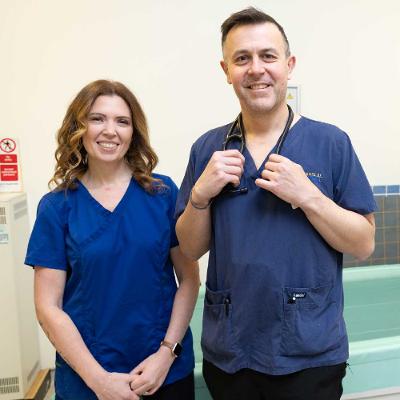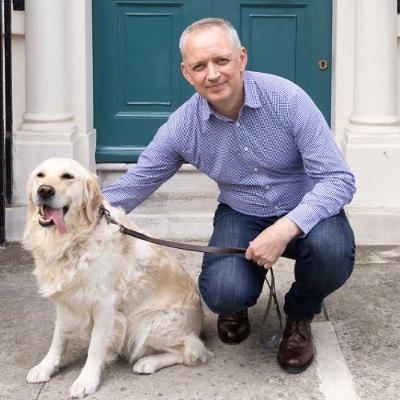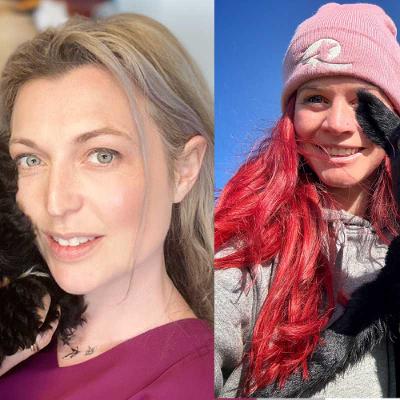Discover Vet Times Podcast
Vet Times Podcast

Vet Times Podcast
Author: Veterinary Business Development Ltd
Subscribed: 238Played: 5,477Subscribe
Share
© All rights reserved
Description
The Vet Times podcast is a regular show in which we speak to individuals making the headlines or providing valuable information for Vet Times readers, delving into the subjects that matter to the UK veterinary profession.
272 Episodes
Reverse
SPONSORED
In today’s episode, sponsored by Royal Canin, we celebrate 20 years of Royal Canin’s partnership with the University of Liverpool’s Obesity Care Clinic – the world’s first specialist weight loss clinic for cats and dogs.
This pioneering collaboration has transformed obesity care, combining expert research with exceptional service for clients and referring vet practices.
Join us as Georgia Woods-Lee and Professor Alex German share how the Royal Canin Obesity Care Clinic is shaping the future of pet health and the vital role vets can play in tackling obesity.
In 2015, Georgia Woods-Lee took the position of clinical lead for the Royal Canin Weight Management Clinic (recently renamed the Royal Canin Obesity Care Clinic) at the University of Liverpool, Small Animal Teaching Hospital, where she is now dealing exclusively with pet obesity care and nutrition.
Georgia was awarded her Certificate in Canine and Feline Veterinary Health Nutrition in 2017, the American Veterinary Technician Specialist (VTS) in nutrition certificate in 2019 , and her BSc (Hons) Veterinary Nursing (Top-up) degree in 2022. Georgia is currently working towards a PhD in pet obesity.
Alex German holds the position of Royal Canin professor of small animal medicine at the University of Liverpool.
He is a 1994 graduate of the University of Bristol and, after spending two years in mixed practice, returned to Bristol to undertake a PhD in mucosal immunology, and then a residency in small animal internal medicine.
He is a diplomate of the European College of Veterinary Internal Medicine and also a RCVS-recognised specialist in internal medicine.
His clinical and research interests include comparative obesity biology, ageing, preventing chronic disease, gastroenterology, and evidence-based veterinary medicine.
For more on the clinic, visit its website at https://www.liverpool.ac.uk/small-animal-teaching-hospital/clinical-services/weight-management/
For this Vet Times Extra podcast, Paul Imrie is joined by RCVS advanced practitioner in small animal practice Richard Sanderson and professional services vet for IDEXX Carole MacColl to discuss faecal antigen testing.
SPONSORED
Parasites pose a serious threat to pets and people. But prevention alone may not be 100% effective.
Updated industry guidelines now recommend intestinal parasite testing at least once a year, regardless of deworming.
Combine your preventives with Faecal Dx antigen testing, and parasites don’t stand a chance.
Faecal Dx antigen testing offers early, accurate detection of the most common intestinal parasites, even in well cats and dogs. Learn more at https://www.idexx.co.uk/en-gb/veterinary/reference-laboratories/fecal-testing/fecal-dx-antigen-test/?utm_source=vet_times&utm_medium=podcast&utm_campaign=rlb_fecaldx_2025
The views and opinions in this recorded conversation expressed by the guest interviewee are the guest interviewee's own and do not necessarily reflect the views of IDEXX.
Richard Sanderson, BVSc, CertAVP(SAP), MRCVS, is an RCVS advanced practitioner in small animal practice and director of Peninsula Vet Referrals.
He graduated from the University of Liverpool in 2009. An advocate for independent veterinary practice, he founded Sanderson Vet in 2016. This started as a mobile vet and has developed into a 24-hour first opinion clinic.
Already accepting a wide range of referrals, he formalised their referral services and opened Peninsula Vet Referrals, which focuses on offering “Affordable experience and accessible expertise”, aiming to make referrals more affordable and easier to access.
Carole MacColl BVMS, PGCert, VetEd FHEA, MRCVS graduated from the University of Glasgow in 2011, and gained experience in first opinion practice before undertaking a rotating internship with a focus on emergency and critical care.
She spent time as an ECC clinician in referral hospitals throughout Australia and the UK, before a role as a senior veterinarian in the RVC’s first opinion teaching hospital.
Carole joined IDEXX as a professional services veterinarian covering the south of the UK in 2021.
Despite growing interest in preventive care, many veterinary teams face a tough reality: wellness testing isn’t always viable, and the data linking it to better patient outcomes is still emerging.
Yet the logic remains compelling – earlier detection should mean earlier intervention – but should wellness testing become the norm in general practice?
This episode explores the clinical value and operational realities when it comes to replacing the ‘wait and see’ with ‘track and find out.’
SPONSORED
This podcast is sponsored by Zoetis, makers of the vetscan range of AI-powered diagnostic analysers, which includes the vetscan Imagyst, vetscan Opticell and vetscan VS2.
For more information on the full range, speak to your Zoetis account manager to learn more or visit the website. (zoetisdiagnostics.com/us/point-of-care/chemistry/vetscan-vs2)
Rory Cowlam BVetMed, PgCert, MRCVS, is a graduate of the RVC with more than a decade’s worth of experience in companion animal veterinary care.
He is a certificate holder in small animal surgery and has a particular interest in preventative care.
Rory works as clinical director of Pickles Vets in Fulham London and, as well as being known for his TV work with Pets Factor and more recently Blue Peter, he also serves as a charity ambassador for the RSPCA and StreetVet.
With many owners still struggling with the cost of caring for their pets, the crisis, together with wider economic pressures, is also having a significant impact on the charitable sector.
Blue Cross director of veterinary services Paul Manktelow joins Allister Webb to discuss the issue and the radical changes his organisation is making in a bid to tackle it.
Podcast music: “Funky Chunk” Kevin MacLeod (incompetech.com), licensed under Creative Commons: By Attribution 4.0 License http://creativecommons.org/licenses/by/4.0/
Angiostrongylus vasorum is a parasite affecting dogs in the UK often with devastating consequences. Over recent years we have seen an increase in prevalence of lungworm disease.
In this podcast, veterinary parasitologist and professor Eric Morgan and Jenny Helm, RCVS specialist in small animal medicine and oncology referral clinician, discuss the prevalence of A vasorum in the UK, the gaps we have in the evidence to date, routine prevention for dogs and novel options for treatment.
SPONSORED
This podcast is sponsored by Zoetis, makers of Simparica Trio – the only oral moxidectin licensed to treat lungworm in dogs.
Simparica Trio is licensed for the treatment of flea and tick infestations, the treatment and prevention of angiostrongylosis and the treatment of gastrointestinal roundworm and hookworm infections1.
For more information on Simparica Trio, speak to your Zoetis account manager to learn more or visit the website (https://www2.zoetis.co.uk/veterinary-hub/companion-animal/dogs/products-and-solutions/simparica-trio/)
References:
1. Simparica Trio SPC
MM-44029
Eric Morgan MA, VetMB, PhD, DipEVPC, MRCVS qualified from the University of Cambridge vet school in 1997 and left mixed practice in Wales to complete a PhD at Warwick and Imperial College London on parasite ecology and epidemiology in Kazakhstan, joining the University of Bristol’s veterinary school in 2003.
There he further developed teaching and research interests in parasite transmission, moving to Queen’s University Belfast in 2017.
He is co-author of more than 200 peer-reviewed papers, seeking especially to understand the impact of weather and climate change on parasite infection patterns and how these can be managed, including for emerging parasites such as A vasorum. As diplomate of the European Veterinary Parasitology College and member of various national and international initiatives, he contributes to the development of sustainable parasite control strategies and their translation into practice.
Jenny Helm, BVMS, CertSAM, Dip-ECVIM, CA FHEA, MRCVS, graduated from the Faculty of Veterinary Medicine, University of Glasgow in 2005, and following this undertook a small animal rotating internship at the RVC in London.
She then spent a short spell in small animal practice before returning to Glasgow to undertake a residency in oncology and internal medicine at the University of Glasgow in 2006.
Jenny obtained her RCVS certificate in small animal medicine in 2008 and passed her European College of Veterinary Internal Medicine (ECVIM) certifying examination and became a diplomate of the ECVIM in September 2012.
Jenny is interested in small animal oncology (especially promoting good quality of life and haematology) and has several academic publications in the fields of internal medicine and oncology, as well as an active research interest in canine lungworm (specifically A vasorum).
As the veterinary sector considers its response to the Competition and Markets Authority’s provisional remedy decisions, a new Big 6 podcast panel considers the current state of play and likely areas of ongoing debate.
Joining Allister Webb are RCVS senior vice-president Linda Belton; SPVS board member Kate Higgins; BSAVA president Julian Hoad; British Veterinary Union chair Suzy Hudson-Cooke; IVC Evidensia CVO Gudrun Ravetz; and competition law academic David Reader.
Credit for music:
"Funky Chunk" Kevin MacLeod (incompetech.com)
Licensed under Creative Commons: By Attribution 4.0 License
With more than 40,000 cases reported in Central America and Mexico since July 2023, the United States is preparing for a potential outbreak of the New World screwworm fly.
The parasitic blowfly – whose flesh-eating larvae feed on the live tissue of warm-blooded animals – was officially eradicated from the US in 1966, but with a case in September less than 70 miles from the border, alarm bells are ringing.
Texas vet Will McCauley joins Chris Simpson to discuss the role veterinarians will have to play in detecting and combating any potential outbreaks.
Podcast music: “Funky Chunk” Kevin MacLeod (incompetech.com), licensed under Creative Commons: By Attribution 4.0 License http://creativecommons.org/licenses/by/4.0/
New BVA President Rob Williams joins Allister Webb to discuss his first few weeks in the role and the challenges facing the UK veterinary sector right now.
Rob shares his thoughts on the Competition and Markets Authority’s provisional remedy recommendations, how the professions can help to secure legislative reform and how clinicians can help to shape a brighter future in their practice.
Credit for music
"Funky Chunk" Kevin MacLeod (incompetech.com)
Licensed under Creative Commons: By Attribution 4.0 License
http://creativecommons.org/licenses/by/4.0/
Speaking at BEVA Congress in September, vet and leading antimicrobial expert Scott Weese challenged current thinking on antibiotic course length and called for evidence to show that shortening courses can lead to the development of resistance.
“How does [administering antibiotics] less cause more resistance?” he asked the packed amphitheatre (https://www.vettimes.com/news/vets/equine/vets-urged-to-treat-patients-not-lab-results-in-fight-against-amr) at Birmingham’s International Convention Centre. “It doesn’t. I’ll buy you a beer if you can give me a plausible explanation for that.”
Here, Prof Weese and fellow antimicrobial expert Ian Battersby join Vet Times’ Chris Simpson to discuss the issue and the ongoing challenges surrounding antimicrobial stewardship.
Podcast music: “Funky Chunk” Kevin MacLeod (incompetech.com), licensed under Creative Commons: By Attribution 4.0 License http://creativecommons.org/licenses/by/4.0/
In this Vet Times Extra podcast, Paul Imrie is joined by Stephen Maxwell, veterinary advisor from MSD Animal Health, to discuss some of the queries to MSD Animal Health’s veterinary support line.
SPONSORED
Caninsulin has been a trusted brand for over 30 years and is used to treat diabetic cats and dogs. In the lead up to Pet Diabetes Month, we’ll talk through some common queries from MSD Animal Health’s Veterinary support service.
MSD also offer a range of free diabetes resources designed to support practices and owners, as well as free diabetes CPD courses. To access these, visit the links below or contact your MSD Account Manager.
https://www.msd-animal-health-hub.co.uk/ahp/caninsulin/tools
https://msdchameleon.cordeo.net/ (printed materials)
Stephen Maxwell is an MSD veterinary advisor and during the past year has been helping front-line veterinarians in the UK with their diabetic cases through technical product support.
NOTE: All pets’ names in this broadcast have been changed to protect identities.
Caninsulin® 40 IU/ml Suspension for Injection contains porcine insulin. POM-V.
Further information is available from the SPC, datasheet or package leaflet.
Advice should be sought from the medicine prescriber.
Prescription decisions are for the person issuing the prescription alone.
Use Medicines Responsibly.
© MSD Animal Health UK Limited. UK-NON-250900041.
With an expected shortage of 24,000 companion animal veterinarians expected in the United States by 2030, the pressure is mounting on veterinary technicians to plug the gap.
At the same time, vet techs are also dealing with familiar issues with retention, burnout, and underutilisation.
Danielle Chesek, a certified vet tech and team lead for the vet tech programme at Penn Foster Group, joins Chris Simpson to discuss the role of veterinary technicians and the issues they’re facing.
Podcast music: “Funky Chunk” Kevin MacLeod (incompetech.com), licensed under Creative Commons: By Attribution 4.0 License http://creativecommons.org/licenses/by/4.0/
In today’s episode, sponsored by Droncit, from global animal health company Vetoquinol, we uncover a hidden but significant issue: tapeworm infections in pets and the serious consequences they can have for farmers.
While often overlooked, untreated tapeworms in pets can contribute to the spread of disease to livestock, threatening farm productivity and livelihoods.
Many commonly used ‘all-in-one’ parasite treatments don’t target tapeworms, which is why Droncit is calling on small animal vets to take the lead by raising awareness during consults and helping pet owners protect both their pets and the rural communities that depend on healthy livestock.
Join us as we hear how farmers are impacted by tapeworm infections in pets and how small animal vet professionals can be a vital link in safeguarding farms from this often overlooked threat.
Cat Henstridge BVSc MRCVS is a graduate of the University of Bristol’s vet school and has worked ever since in first opinion small animal practice.
She has recently opened her own clinic with her husband and is enjoying the challenge. Her interests have always been in client communication and collaboration and she loves being able to work as a team with owners to help their pets get better. In addition to her real-life vetting, she also has a significant online presence as ‘Cat The Vet’, where she shares this passion, and many others, with her audience.
Hannah Jackson main two passions in life are animals and adventure. In 2019 adventure loving Hannah completed the selection process for SAS-Who-Dares Wins. Surviving in arctic conditions in the Chilean Andes, Hannah was the first intake which included female recruits and was one of only two females to complete the course. She thrives on the extreme challenges and the ability to test both her physical and mental resilience and strength.
As a farmer, Hannah’s love of wildlife has seen her complete a number of projects including contributing to a Killer Whale research project for Orca Lab, where she lived for weeks on a cliff in British Columbia in a tent with no running water or electricity whilst observing the impact of tourism on whale’s behaviour.
Hannah has appeared on ‘Emma and AJ Get to Work’, ‘Countryfile’, ‘Country Showdown’, ‘Inside Out’ along with various other shows across the channels.
With avian flu and bluetongue continuing to pose challenges, plus the re-emergence of foot and mouth disease in mainland Europe, 2025 has so far been a year of growing unease at the threat from animal diseases.
As politicians and industry groups voice their concerns about present and future challenges, Allister Webb asks what should vets really be concerned about and how ready are we to respond to the next major disease outbreak?
Loic Jégou, Ceva Animal Health’s vice-president for Europe, joins Allister to share his thoughts on the current situation and what needs to be done to prevent a future crisis.
Podcast music: “Funky Chunk” Kevin MacLeod (incompetech.com), licensed under Creative Commons: By Attribution 4.0 License http://creativecommons.org/licenses/by/4.0/
As the Government issues a plea to holiday makers not to bring back meat and dairy products from Europe amid concerns over foot-and-mouth disease (FMD), Chris Simpson speaks to the UK’s chief veterinary officer Christine Middlemiss.
The plea comes as the Government launches an updated FMD control strategy to enhance its ability to prevent or respond to FMD outbreaks.
An EU-wide ban on personal imports of meat and dairy was issued by Defra in April after a wave of cases were discovered in several countries across the continent.
Podcast music: “Funky Chunk” Kevin MacLeod (incompetech.com), licensed under Creative Commons: By Attribution 4.0 License http://creativecommons.org/licenses/by/4.0/
With thousands of aspiring students waiting to hear if they’ve achieved the grades they need to go to vet school this autumn, Allister Webb takes a look behind the scenes at the University of Central Lancashire’s new veterinary training facilities in Preston.
The department, which is preparing to welcome its third cohort in September, recently opened its new school building following a £40 million building project.
Pete Holland, UCLan’s director of veterinary partnerships, joins Allister to discuss the school’s continuing development and some of the key issues currently facing the veterinary education sector.
Podcast music: "Funky Chunk" Kevin MacLeod (incompetech.com), licensed under Creative Commons: By Attribution 4.0 License http://creativecommons.org/licenses/by/4.0/
Ixodes species ticks have been spreading tick-borne encephalitis virus throughout Europe, and there are concerns about the zoonotic potential for the UK.
Parasitologist Ian Wright discusses the latest situation in this Vet Times Podcast.
Ian Wright, BVMS, BSc, MSc, MRCVS is a practising vet and co-owner of The Mount Veterinary Practice in Fleetwood, Lancashire.
He has a master’s degree in veterinary parasitology and is head of the European Scientific Counsel Companion Animal Parasites (ESCCAP) UK and Ireland, and guidelines director for ESCCAP Europe.
An accompanying article to this podcast, “The rise and rise of tick-borne flaviviruses”, is in Vet Times (2025), Volume 55, Issue 25, Pages 6-10.
It is online at vettimes.com at https://www.vettimes.com/clinical/small-animal/the-rise-and-rise-of-tick-borne-flaviviruses
In this Vet Times Extra podcast, we're delving into the pivotal role that research plays in building our understanding of the human-animal bond. Dr Tammie King, senior research manager, and Dr Vanessa Ashall, human-animal interaction technical leader, are both experts from the Waltham Petcare Science Institute.
SPONSORED
The Waltham Petcare Science Institute is Mars Petcare’s science centre, where their mission is to improve the lives of pets through science, in support of their purpose of creating a better world for pets.
Researchers at Waltham have recently launched the Pets and Wellbeing Study programme, known as PAWS. Working in collaboration with leading global academic institutions and experts, the multi-study PAWS programme will explore the relationships between pets and people and the role pets play in well-being across multiple geographies and demographics.
Engaging more than 35,000 pet owners across more than 20 countries, this ambitious research programme aims to deepen our understanding of the mutual benefits of the human-animal bond through robust scientific data.
Dr Tammie King is a member of the research leadership team at the Waltham Petcare Science Institute.
Her passion lies in improving dog and cat health through evidence-based knowledge. In fact, Dr King holds a PhD in anthrozoology – the study of human-animal interactions – and a Bachelor of Science (Hons) in animal behaviour.
Vanessa Ashall is technical lead for the PAWS research programme and is central to defining the research strategy. It’s Vanessa who holds responsibility for ensuring the portfolio of projects truly demonstrate Waltham’s commitment to robust, innovative and impactful research into the human-animal bond.
Vanessa is a European veterinary specialist in animal welfare science, ethics and law, a bioethicist, a social scientist and a cross disciplinary HAI researcher.
In this podcast Phil Elkins discusses respiratory diseases in cattle, essentially preventive versus reactive care, and ensuring farm vets and farmers engage on countering the threats.
Phil Elkins qualified in 2005 from The University of Edinburgh and, following stints in Cheshire and New Zealand, spent the majority of his career in clinical practice in Cornwall, during which time he gained a certificate in advanced veterinary practice in cattle.
Following 15 years in clinical practice and a stint working for an agri-tech company, Phil now works as an independent consultant to both farms and industry bodies. He is a former council member of the BVA.
He wrote “Respiratory disease in cattle: preventive versus reactive care” for Vet Times Livestock (2025), Volume 11, Issue 1, Pages 9-10 (which went out with Vet Times Volume 55, Issue 12). The article is available online at vettimes.com [https://www.vettimes.com/clinical/livestock/respiratory-disease-in-cattle-preventive-versus-reactive-care]
SPONSORED
This podcast is sponsored by Zoetis, which has recently launched Protivity, the UK’s first authorised Mycoplasma bovis vaccine for cattle.
What if you could be proactive instead of reactive when it comes to Mycoplasma bovis?
Protivity, the first modified-live vaccine for Mycoplasma bovis in cattle, is now available in the UK.
The days of relying on antibiotics alone to help control Mycoplasma bovis are over. It’s time to change the game for your herds with Protivity.
To learn more, UK veterinary professionals can visit the website. [https://bit.ly/4jRJxv3]
Vet Times was recently invited to the biggest vet show on earth – VMX in Florida, where we had the pleasure of catching up with the man behind it all, NAVC CEO Gene O'Neill…
In this Vet Times Extra podcast, Stephanie Armstrong, regional president at Zoetis, explores the mental health landscape in today’s veterinary profession, including the challenges and possible counteractions.
Sponsored:
As the world’s leading animal health company, Zoetis is driven by a singular purpose: to nurture our world and humankind by advancing care for animals.
After innovating ways to predict, prevent, detect, and treat animal illness for more than 70 years, Zoetis continues to stand by those raising and caring for animals worldwide – from veterinarians and pet owners to livestock farmers and ranchers.
The company’s leading portfolio and pipeline of medicines, vaccines, diagnostics and technologies make a difference in more than 100 countries.
About the interviewee:
Stephanie Armstrong is regional president at Zoetis, part of the Zoetis senior leadership team, where she oversees operations and growth across her team.
A trained veterinarian and successful business leader, Stephanie encompasses a rare combination of frontline veterinary experience and strategic acumen in the animal pharmaceutical industry, making her uniquely positioned to drive innovation and impact across the animal health sector.
An advocate for positive change with a one health approach, Stephanie is also deeply committed to supporting the mental health and well-being of veterinarians, recognising the unique challenges they face. Stephanie is headstrong in her commitment to breaking the stigma surrounding mental health in the industry, as it is a topic she is particularly passionate about, often talking about this global issue from a thought leadership perspective.
Stephanie is dedicated to advancing the veterinary profession by elevating the voices of industry talent, advocating for vets, and shining a light on the critical challenges faced by both vets and livestock farmers today.
As a member of the council at the RVC, Stephanie plays a pivotal role in shaping the future of veterinary education and advancing initiatives that bridge the academic and practical applications of animal care.
























